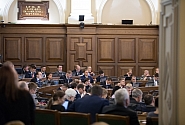
On Thursday, 27 February, the Saeima examined the Final Report of the Parliamentary Committee for investigating the objectives and impact of introducing aid in the form of the mandatory procurement component (MPC).
‘The Committee firmly insists that a political decision must be made so that the MPC system is abolished immediately. This saga must come to an end, and there is no reason to cater to those involved in this affair any longer. In addition, the capacity to assume responsibility and act should be reconsidered at all executive levels, since the MPC system illustrates how all stakeholders, whether direct or indirect, including institutions such as the Ministry of Economics, the Ministry of Justice, the Cabinet of Ministers, the State Chancellery, law enforcement authorities, the Saeima, and even presidents, turned a blind eye and deaf ear to flagrant violations, enabling the system to exist for so many years. There has been a lack of political will to put an end to it,’ said Ieva Krapāne, Chair of the Committee, earlier.
The Final Report indicates that the political responsibility for inappropriate state aid in the energy sector, including the MPC affair, must be assumed jointly by all the state officials who had permitted the introduction and continuation of these measures.
It is also concluded in the Final Report that timely and adequate parliamentary oversight of the MPC has not been ensured since 1997. The Saeima had identified shortcomings in both the legal framework and the conduct of the executive power, yet it failed to task the government with immediate rectification of the found deficiencies.
The MPC scheme involved deliberate action taken by the public administration within a flawed legal framework, with knowledge of the potential consequences. This is contrary to the public interest and legal principles of a democratic state. Furthermore, the Committee had observed representatives of the executive branch withhold and distort information, noted Krapāne.
According to the Final Report, state aid policy in the energy sector lacks transparency, mutual coordination and supervision; there is no common planning to help deliver results in the sector. Instead of providing a solution based on the interests of the Latvian people, decisions on the mandatory procurement of renewable energy and electricity procurement price were made in order to support specific businesses operating in the field of renewable electricity generation. The unlawful conduct of some businesses has worsened the situation, and uncovering and proving these actions have cost considerable public resources and are delayed due to reduced capacity of control authorities.
On the positive side, the Final Report welcomes the steps taken to improve the control mechanism, entrusting the State Construction Control Bureau of Latvia with the responsibility for the task. However, due to staff shortages, no more than 50 on-site inspections can be conducted in power stations every year. Thus, general public is exposed to additional threat of unfair entrepreneurship still taking place. Additional societal risks can be attributed to the diminishing capacity of the criminal investigation institutions, due to lack of qualified staff, among other reasons.
MP Viktors Valainis, member of the Committee, has supplemented the parliamentary inquiry report with his independent opinion.
The Parliamentary Committee for investigating the objectives and impact of introducing aid in the form of the mandatory procurement component, aid eligibility criteria, aid intensity, the Commission's Decision in Case SA.43140 (2015/NN) of 24 April 2017, and incurred damages and action taken by law enforcement authorities was established in June 2019.
Saeima Press Service







